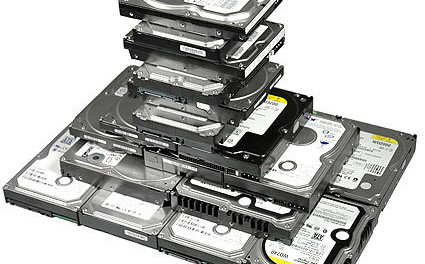Hard Time for Hard Drives
Or What Happens to Your ‘FILM’ When Your Hard Drive Fails

By Ron Merk
I’m going to make this piece short and sweet. Well, maybe not sweet. As my readers know, I’ve been banging the drum loudly on the issue of film preservation and long-term storage of our hard-fought battles to get a film made and out there, and then to have access to the files that make up that film in the future. The Science and Technology Council of The Academy of Motion Picture Arts and Sciences has studied the situation, and produced two major reports on the subject of long-term storage and retrieval of digital data. The Digital Dilemma 1 and 2 are both on the website of the Academy (www.oscars.org). It’s very clear from these reports that digital data, those one and zeros that make up our film are in danger of becoming just ZERO if the media or drives on which they are stored fail, become obsolete, or are damaged by some accident.
If you want some further assurance of the danger, take a look at this recent report on the failure rate of hard drives, with emphasis on which manufacturer’s drives fail most often. While I cannot guarantee that these figures are accurate or perfect, I do think they point out that something is not as it should be with hard drives. They do not provide us with archival storage and retrieval (defined as 100 years by the international archival community). If you want to know more about hard drive failure rates, you might be interested in the following.
Backblaze is a cloud backup storage provider that builds their own hardware. Each year they compile and share a report of the reliability and failure rates of different hard drive models and brands, based on their continuous use in a production environment.
If you’re interested, the results are here: https://www.backblaze.com/blog/best-hard-drive/
It seems that a certain brand that has been knocked for relatively high failure rates in the past is continuing the trend.
Now, I’m not a betting person, except for the purchase of an occasional lottery ticket when the jackpot reaches $200 million, so I’m not prone to betting all the work I’ve done on a film on a hard drive that can fail, and fail me. So, I’ve urged readers of this site to output their digitally-created film to FILM. By that I mean output to at least one 35mm copy, and to put that copy in proper storage at a professionally managed archive, like The UCLA Film and Television Archive, The Academy Film Archive, The Library of Congress, and other such archives who will gladly accept a deposit of your film. Yes, for now film is the only “archival” medium for which we have a history of more than 100 years. So, as someone once said, “a word to the wise is sufficient.”
We do “hard time” to get our films made. When the films “get out” after our “hard labor” we want them to stay out for the foreseeable future, and not get “locked up” forever when the hard drive gets locked down by some technical failure. I want my films to be around long after I’m gone. How about you?





